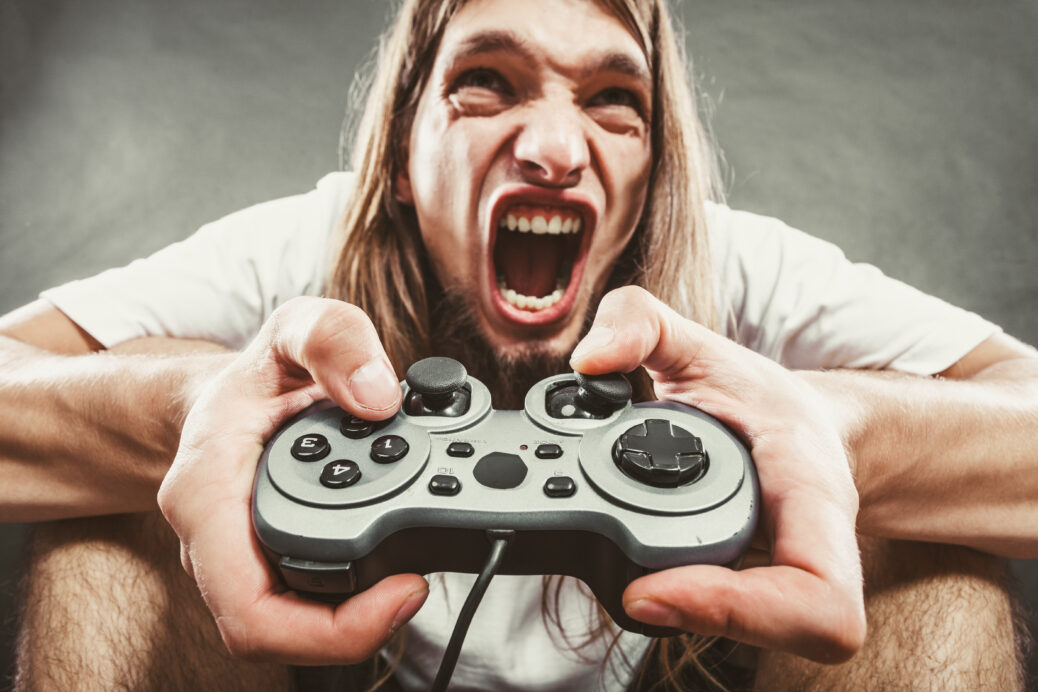The Surprising Reason Why You Keep Throwing Your Controller When You Lose
Introduction
Why is it that we have all heard of someone who broke their TV after throwing a controller in a rage? Or of someone who punched a hole in their wall after their team lost a game. Enjoyable pastimes can also be a source of frustration and anger, especially for men. We’ll explore where that anger comes from, why men tend to experience more anger than women, and strategies for controlling this anger in the future.
Where Does the Anger Come From?

Anger is a complex emotion that can stem from various sources. Men, who are often told to repress emotions, may accumulate anger over time. This can lead to outbursts under the right circumstances. Video and sports games especially can create such circumstances, because of their competitive and occasionally toxic environment.
A study found that those who played a competitive game reported higher levels of anger and aggression than those who played a non-competitive game1. And the anonymous nature of online video games can also lead to toxic behavior and environments, including harassment, verbal abuse, and use of slurs. This can all contribute to feelings of anger and frustration.
However, there have also been links to depression and anger. Nearly 1 in 10 men experience depression or anxiety, and less than half will receive treatment2. Research shows that depression presents differently in men and women, and that anger may be a more prominent symptom in men.
One study found that men with depression report higher levels of anger, irritability, and aggression than women. They are also more likely to experience angry outburst and engage in risk behavior compared to women3. Additional research has also found that men are less likely to seek help for depression and are more likely to deny their symptoms or engage in avoidance coping4.
Gender Differences in Expression of Anger
Men and women often have different emotional responses and processing strategies when feeling anger due to major biological and psychological differences.
Women have a larger amygdala, which is the part of the brain responsible for processing emotions. This can lead to women tending to have stronger emotional responses than men. However, women tend to use more cognitive strategies, such as seeking social support or cognitive reappraisal, to regulate their emotions.
Men, on the other hand, have a smaller prefrontal cortex, which is the part of the brain responsible for cognitive control. This can lead to men tending to have more difficulty in regulating negative emotions compared to women. This is exacerbated by men tending to use more behavioral strategies, such as distraction or suppression, to regulate their emotions5.
Another study found that while women are more likely to express their emotions through facial expressions, tone of voice, and body language, men are less likely to express their emotions. However, the same study found that men tend to experience emotions more intensely than women. This is because men have higher levels of testosterone, which can lead to an increase in emotional arousal. The study also found that men tend to experience more negative emotions, such as anger and fear, than women6.
Social Barriers for Emotional Regulation

There are also societal factors that lead to men having more difficulty with emotional regulation as well:
- Socialization. Men are often taught in society to suppress their emotions and be tough. However, a study found that men who do that tend to be more prone to depression, anxiety, and anger7.
- Stigma and Fear of Judgement. Research has shown that men who seek help for emotional problems are often seen as weak or incompetent8. Additionally,t men may be more likely to experience shame about depression which can contribute to feelings of anger and frustration which can lead to isolation9
- Lack of Role Models. Because of the stigmas in place, there may also be a lack of male role-models who are open emotionally. A study found that men who lack positive male role models may struggle to develop emotional intelligence skills10.
Strategies for Managing Anger

If you or someone you know is struggling with anger outbursts, they may benefit from these techniques to help control and process their anger.
- Breathing Techniques. Don’t worry, we won’t tell you to count from 1 to 10. Slow deep breathing stimulates something called the ‘vagus nerve’. This nerve runs from your brain to your stomach, and is in charge of the “fight or flight” reflex. Breathing like this slows down your heart rate, reduces your blood pressure, and relaxes your muscles. Focus on your heartbeat until it slows down.
- Develop Increased Awareness. The buzzword they’re using for this these days is “mindfulness.” But it is pretty simple to implement:
- Identify the physical signs. Do you start to clench your fists? Do you feel your blood pressure rise? Do you grit your teeth? Do you feel your throat feel tight or do you start raising your voice? As soon as you start to see these signs, remove yourself from the situation.
- Identify the cause. As we discussed, anger can come from a lot of different places that don’t necessarily have to be happening right now. Sometimes anger is caused by other feelings, like hurt, disrespect, neglect, or embarrassment. When you identify the cause, THEN you can find a strategy to better handle things in the future like asking someone else to modify their behavior or reframing the situation.
- Identify the consequences. When you still feel inclined to express your anger, force yourself to go through the consequences of how you want to express yourself. Can you afford a new TV if you put your controller through it? Do you really have the time to fix a hole in your wall? How will your significant other feel if you yell at them? Then it’s about exploring ways to expend that energy in a less destructive way.
- Identify the physical signs. Do you start to clench your fists? Do you feel your blood pressure rise? Do you grit your teeth? Do you feel your throat feel tight or do you start raising your voice? As soon as you start to see these signs, remove yourself from the situation.
- Safe Physical Outlet. Finding a physical motion that releases the most energy from you and leaves you feeling the most satisfied. Many people opt for stress balls. Squeeze and then release. Then squeeze even harder, and release. Continue this, trying to squeeze harder than the time before.
- Breaks and Check Ins. Sometimes it can be as simple as asking yourself, “Am I still having fun?” If not, there is no need to continue doing that activity. Stepping away for snacks, water, or even a breath can also be helpful. An important thing that many people forget about anger is that it is very temporary and fleeting by nature. By delaying a physical response and not feeding into the anger, it might go away on its own.
Conclusion
Overall, these studies suggest that there are significant mental and societal factors that cause men to become more prone to anger in certain situations. However, understanding these factors and exploring strategies for controlling anger can help men have more peaceful and enjoyable experiences when participating in their hobbies.
If you enjoyed this article, please consider joining our community!
References
- Andre Dowsett, Mervyn Jackson. The effect of violence and competition within video games on aggression, Computers in Human Behavior, Volume 99, 2019, Pages 22-27, ISSN 0747-5632, https://doi.org/10.1016/j.chb.2019.05.002.
- Mental Health America (MHA). Infographic: Mental Health for Men. mhanational.org. https://www.mhanational.org/infographic-mental-health-men
- Lamers F, de Jonge P, Nolen Wa, Smit JH, Zitman FG, Beekman ATF, Penninx BWJH. Identifying depressive subtypes in a large cohort study: results from the Netherlands Study of Depression and Anxiety (NESDA) J. Clin. Psychiatry. 2010;71:1582–1589.
- Oliffe J. L., Ogrodniczuk J. S., Gordon S. J., Creighton G., Kelly M. T., Black N., Mackenzie C. (2016). Stigma in male depression and suicide: A Canadian sex comparison study. Community Mental Health Journal, 52(3), 302–310. 10.1007/s10597-015-9986-x
- McRae, K. et al. (2008) Gender differences in emotion regulation: An fmri study of cognitive reappraisal, Group processes & intergroup relations : GPIR. U.S. National Library of Medicine. Available at: https://www.ncbi.nlm.nih.gov/pmc/articles/PMC5937254/ (Accessed: April 27, 2023).
- Chaplin, T.M. and Aldao, A. (2013) Gender differences in emotion expression in children: A meta-analytic review, Psychological bulletin. U.S. National Library of Medicine. Available at: https://www.ncbi.nlm.nih.gov/pmc/articles/PMC3597769/ (Accessed: April 27, 2023).
- Levant, R. F., Hall, R. J., Williams, C. M., & Hasan, N. T. (2009). Gender differences in alexithymia. Psychology of Men & Masculinity, 10(3), 190–203. https://doi.org/10.1037/a0015652
- Addis, M. E., & Mahalik, J. R. (2003). Men, masculinity, and the contexts of help seeking. American Psychologist, 58(1), 5–14. https://doi.org/10.1037/0003-066X.58.1.5
- Seidler Z. E., Dawes A. J., Rice S. M., Oliffe J. L., Dhillon H. M. (2016). The role of masculinity in men’s help-seeking for depression: A systematic review. Clinical Psychology Review, 49, 106–118. doi: 10.1016/j.cpr.2016.09.002
- McDermott, R. C., Naylor, P. D., McKelvey, D., & Kantra, L. (2016, May 5). College Men’s andWomen’s Masculine Gender Role Strain and Dating Violence Acceptance Attitudes: Testing Sexas a Moderator. Psychology of Men & Masculinity. Advance online publication. http://dx.doi.org/10.1037/men0000044


